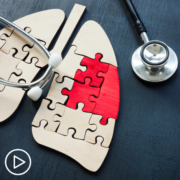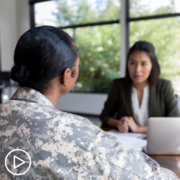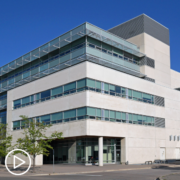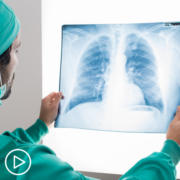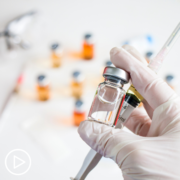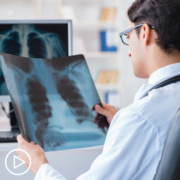How Can Advanced Lung Cancer Be Explained to Newly Diagnosed Veterans?
How Can Advanced Lung Cancer Be Explained to Newly Diagnosed Veterans? from Patient Empowerment Network on Vimeo.
How can newly diagnosed advanced non-small cell lung cancer (NSCLC) veterans be informed about their diagnosis? Expert Dr. Drew Moghanaki from UCLA Health discusses the approach and information he shares with veterans and proactive advice for their care.
[ACT]IVATION TIP
“…all veterans to ask their clinicians, ‘Is my cancer the spreading type or not?’ Because that really helps understand what treatments and why what treatments are being recommended.”
Download Resource Guide | Descargar guía de recursos
See More from [ACT]IVATED NSCLC Veterans
Related Resources:
Transcript:
Lisa Hatfield:
Dr. Moghanaki, how do you explain advanced non-small cell lung cancer to your veteran patients and their care partners and families?
Dr. Drew Moghanaki:
Yeah, I’m glad you bring this question up. So non-small cell lung cancer often can be localized or it can be advanced. And localized means, as far as we can tell, it’s only in one area but advanced means that it’s started to spread, and they can spread to the lymph nodes and then other parts of the lungs or even other parts of the body. And I try to teach all my veterans, look, we’ve got surgery, we’ve got radiotherapy, and we’ve got drug therapies. And if it’s spreading, we really need the drug therapy to put the drugs into the bloodstream and be able to chase down the cancer wherever it may be.
Because also once it’s starting to spread, there’s going to be not just visible components that we see on the scan, but very likely invisible components. And if tumors are invisible on the scans, well, there’s nothing to cut or to aim at with radiotherapy. So really drug therapy becomes a cornerstone. So I recommend to all my veterans with lung cancer to make sure there’s a clear understanding. “Has the cancer spread yet? Is it the spreading type or not?” Because that really then helps better understand why the different treatments are being recommended.
So my activation tip is for all veterans to ask their clinicians, “Is my cancer the spreading type or not?” Because that really helps understand what treatments and why what treatments are being recommended.
Share Your Feedback
Create your own user feedback survey

